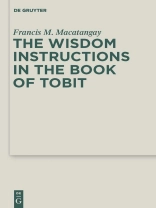Despite the resurgence of scholarly interest in the Book of Tobit in recent years, an important aspect of this deuterocanonical book has been largely overlooked. Within it, there is an instruction manual for an effective way of being and living in exile, namely the wisdom instructions in Tobit 4. With glances at Tobit 12 and Tobit 14 where the wisdom instructions are repeated in shorter form, this monograph discusses the function of the wisdom discourse in the literary design of the narrative. Moreover, it examines how the wisdom instructions of Tobit demonstrate the vital role of the sapiential tradition in forming and maintaining Jewish identity in the Diaspora. Contextualizing the wisdom instructions not only within the narrative but also within the realities of Second Temple Judaism, it is argued that the author of Tobit saw the validity and employed the resources of the Jewish wisdom tradition in reinterpreting some of the traditional claims of covenant faith.
Using the Sinaiticus as the textual basis of study, it shows that the lengthy wisdom lecture of Tobit displays an inner logic that structures the collection of seemingly unrelated sayings. The instructions reinterpret a major deuteronomic concern to remember the Lord always. For Tobit, the practice of righteousness, the practice of wise behavior, and the practice of prayer realize and concretize such remembrance. Addressed to those in the Dispersion, Tobit’s wisdom instructions are meant to foster and shape a distinct ethos of truth, righteousness and mercy.
เกี่ยวกับผู้แต่ง
Francis M. Macatangay, University of St. Thomas School of Theology at St. Mary’s Seminary in Houston, TX, USA.












